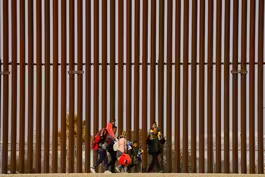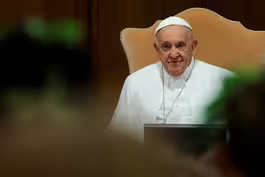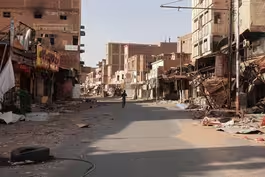
Israeli tanks reach central Rafah as outrage intensifies
Clip: 5/28/2024 | 9m 9sVideo has Closed Captions
Israeli tanks reach central Rafah amid outrage following deadly strike on refugee camp
Israel kept up its operations in Rafah despite global outrage over an airstrike on Sunday that killed displaced Gazans sheltering in tents. Nick Schifrin reports on Israel’s initial investigation into that incident and speaks with Amb. David Satterfield, a senior State Department advisor on the Middle East, about the humanitarian situation in Gaza and U.S. policy toward Israel.
Problems playing video? | Closed Captioning Feedback
Problems playing video? | Closed Captioning Feedback
Major corporate funding for the PBS News Hour is provided by BDO, BNSF, Consumer Cellular, American Cruise Lines, and Raymond James. Funding for the PBS NewsHour Weekend is provided by...

Israeli tanks reach central Rafah as outrage intensifies
Clip: 5/28/2024 | 9m 9sVideo has Closed Captions
Israel kept up its operations in Rafah despite global outrage over an airstrike on Sunday that killed displaced Gazans sheltering in tents. Nick Schifrin reports on Israel’s initial investigation into that incident and speaks with Amb. David Satterfield, a senior State Department advisor on the Middle East, about the humanitarian situation in Gaza and U.S. policy toward Israel.
Problems playing video? | Closed Captioning Feedback
How to Watch PBS News Hour
PBS News Hour is available to stream on pbs.org and the free PBS App, available on iPhone, Apple TV, Android TV, Android smartphones, Amazon Fire TV, Amazon Fire Tablet, Roku, Samsung Smart TV, and Vizio.
Providing Support for PBS.org
Learn Moreabout PBS online sponsorshipGEOFF BENNETT: Today, Israel kept up its operations in Rafah in Southern Gaza.
That's despite global outrage over an airstrike Sunday that killed displaced Gazans sheltering in tents.
Nick Schifrin reports on Israel's initial investigation into that incident and speaks to a senior State Department adviser on the Middle East as the violence continues.
NICK SCHIFRIN: In Southern Gaza today, another makeshift home to which Gazans had fled now ruined and riddled with bullets.
In the shadow of a U.N. office with constant Israeli drones overhead, survivors are exhausted and hopeless, their little protection long ago pierced.
FOUAD MAAROUF, Displaced Gazan (through translator): I went into the tent and found the woman was bleeding and the children were bleeding.
All the children that were in the tent were wounded.
Not one of them came out in one piece.
NICK SCHIFRIN: A few miles north, in what Israel has labeled a safer zone, today the living felt outnumbered by the dead.
Gazan officials say this violence hit Al-Mawasi, Israel's -- quote - - "humanitarian area" north of Rafah city.
But an Israeli official told "PBS NewsHour" there was no Israeli military activity in the area at that time.
And, today, the Israeli military said the Sunday strike that incinerated a tent city, burning and killing what a humanitarian organization today estimated to be 200 civilians, also targeted and killed two Hamas leaders.
Israel says its initial strike hit 180 meters, or almost 600 feet, from the camp for the displaced, and the fire was not caused by its weapon.
REAR ADM. DANIEL HAGARI, Spokesperson, Israeli Defense Forces: We are looking into all possibilities, including the option that weapons stored in a compound next to our target which we did not know of may have ignited as a result of the strike.
NICK SCHIFRIN: But that was cold comfort to the toddler who wouldn't flee without her prized possession.
Those fleeing Rafah today have nowhere to go, but they say they can't stay here.
The U.N. said today one million had fled Rafah just in the last three weeks.
As for humanitarian aid, the U.S. said today it had to temporarily pause the use of its military-built pier into Gaza after waves had damaged it.
Overall today, the U.N. says 200 trucks entered Gaza -- that's the number as of yesterday -- far short of the 500-plus trucks Gaza needs daily.
For more on the humanitarian situation in Gaza, as well as U.S. policy toward Israel, we turn to Ambassador David Satterfield, senior adviser to the State Department.
He recently stepped down as U.S. special envoy for Middle East humanitarian issues.
He is also the director of Rice University's Baker Institute for Public Policy.
Ambassador Satterfield, thanks very much.
Welcome to the "NewsHour."
As we just noted, Israel today said the fire that killed so many in a tent camp on Sunday was caused by a secondary explosion.
Is this exactly the kind of incident that you were warning Israel about when you were warning it against a major operation in Rafah?
DAVID SATTERFIELD, Former U.S. Special Envoy for Middle East Humanitarian Issues: We were concerned in advance of the Rafah operation about two things, first, the effect of displacement, again, because these people have been multiply displaced, of a significant civilian population.
That displacement has in fact occurred.
Our second concern was about the physical impact of an operation, however confined, on the ability to move humanitarian assistance from Kerem Shalom, from Rafah terminal, into Gaza proper.
And, there, we have had significant challenges since the operation began.
NICK SCHIFRIN: When it comes to the threshold of punishing Israel for a Rafah operation that the U.S. has warned against, Jake Sullivan, the national security adviser, said this last week: JAKE SULLIVAN, U.S. National Security Adviser: One of you asked me the last time I was standing at this podium, how are you going to judge this?
And I said that there's no mathematical formula.
What we're going to be looking at is whether there is a lot of death and destruction from this operation, or if it is more precise and proportional.
And we will see that unfold.
NICK SCHIFRIN: Does the incineration of so many people in that tent camp on Sunday match -- quote -- "a lot of death and destruction"?
DAVID SATTERFIELD: We continue to regard what is happening on the ground in Rafah as a limited operation in terms of its scope.
But the effect, heartbreaking as it is, to see the images of civilians, women and children, in particular, suffering in this, we are not in a position to make an independent judgment on what was responsible, who was responsible for that incident.
NICK SCHIFRIN: But even if you don't know exactly who or what was responsible, the kind of images we saw and the kind of numbers we saw from the Sunday incident, is this not exactly what the U.S. was concerned about?
DAVID SATTERFIELD: We are concerned about maximum efforts being undertaken by Israel to protect as much as possible in this conflict, which Hamas brought about, the ability of civilians to live in as much security as possible.
This is a very tough fight.
We understand that.
We understand the need to address the Hamas battalions that remain in Rafah.
But the manner of addressal has to be done as carefully as possible.
NICK SCHIFRIN: Is there a number of deaths, or is there a particular military movement that would cross the threshold that President Biden has set that would lead to more weapons withholdings?
DAVID SATTERFIELD: It's not a mathematical question.
There is not a certain number that creates a threshold here.
It is the totality of what is going on.
And the president has made this, as have other senior officials, that we do not believe a full-blown ground maneuver campaign in Central Rafah is appropriate, or could be supported by the United States.
We have not, as of this moment seen such a campaign.
NICK SCHIFRIN: And yet we have seen, according to the U.N., some one million people flee Rafah in the last three weeks.
Again, did you warn the Israelis that this kind of displacement would happen, and have they prepared enough for it?
DAVID SATTERFIELD: We expressed two primary concerns.
One was that, no matter how precise an operation was in terms of its intent or actual scope, the effect on a multiply displaced population would be a much larger exit from Rafah than Israel itself had instructed or planned for.
And, in fact, we have seen exactly that take place.
Our second concern is that such a displacement would need to have adequate preparation in terms of shelter, in terms of feeding, sanitation, medical support for those moving.
We did not believe, prior to the operation beginning, that such a credible, executable plan existed.
We do not see adequate support for that population that moved on the ground today.
NICK SCHIFRIN: Zooming out, do you think Hamas can be defeated with a military operation?
DAVID SATTERFIELD: The defeat of Hamas requires two things.
It does require military action.
Hamas has a terrorist army that started out at some 30,000 persons.
Only a portion of those numbers have been taken off the battlefield.
Yes, military action is required, but political action is also required.
You cannot defeat an idea without a counteridea.
And the administration has been very clear we believe Israel must outline, and outline clearly, a commitment to an alternate political vision, to an alternate horizon than Hamas' grim Islamist extremist vision.
And that is a credible pathway to a two-state resolution.
NICK SCHIFRIN: The U.S.' approach to Netanyahu has been to offer him a choice.
You can either go down the current road of fighting, perhaps endlessly, in Gaza, or you can take the so-called high road, the project that the U.S. has been working on, not only that envisions a future of Gaza, but also perhaps normalization with Saudi Arabia.
What happens if Netanyahu does not take the choice that the U.S. is pushing for?
DAVID SATTERFIELD: Nick, I'm not going to comment on hypotheticals, but I will say there is an opportunity here for the region, for Israel, for Palestinians to move forward in a different way, in a more positive direction than in the past.
It's essential here that Gaza not return to what it was before October 7, that the people of Gaza, those 2.2 million, not be held in rigid control by a terrorist group.
They, the Palestinians, deserve more, and all of us are working to try to hold out the prospect of more and better for them.
NICK SCHIFRIN: Ambassador David Satterfield, thank you very much.
DAVID SATTERFIELD: Thank you, Nick.
Biden considers temporarily closing border to curb crossings
Video has Closed Captions
Clip: 5/28/2024 | 6m | Biden considers temporarily closing southern border to curb flow of migrant crossings (6m)
How marijuana's reclassification could change drug policy
Video has Closed Captions
Clip: 5/28/2024 | 5m 35s | How marijuana's reclassification could change U.S. drug policy (5m 35s)
Poet Tayi Tibble draws on guidance of Polynesian ancestors
Video has Closed Captions
Clip: 5/28/2024 | 5m 25s | Māori poet Tayi Tibble draws on guidance of Polynesian ancestors in 'Rangikura' (5m 25s)
Pope apologizes for using slur while discussing gay clergy
Video has Closed Captions
Clip: 5/28/2024 | 5m 48s | Pope apologizes for using slur while discussing opposition to gay men in priesthood (5m 48s)
Sudan's civil war brings killings, torture, famine
Video has Closed Captions
Clip: 5/28/2024 | 7m 29s | Millions living through nightmare as Sudan's civil war brings killings, torture, famine (7m 29s)
What happened during closing arguments in Trump's trial
Video has Closed Captions
Clip: 5/28/2024 | 7m 42s | What was said during closing arguments in Trump's hush money trial (7m 42s)
Providing Support for PBS.org
Learn Moreabout PBS online sponsorship
- News and Public Affairs

FRONTLINE is investigative journalism that questions, explains and changes our world.

- News and Public Affairs

Amanpour and Company features conversations with leaders and decision makers.












Support for PBS provided by:
Major corporate funding for the PBS News Hour is provided by BDO, BNSF, Consumer Cellular, American Cruise Lines, and Raymond James. Funding for the PBS NewsHour Weekend is provided by...






